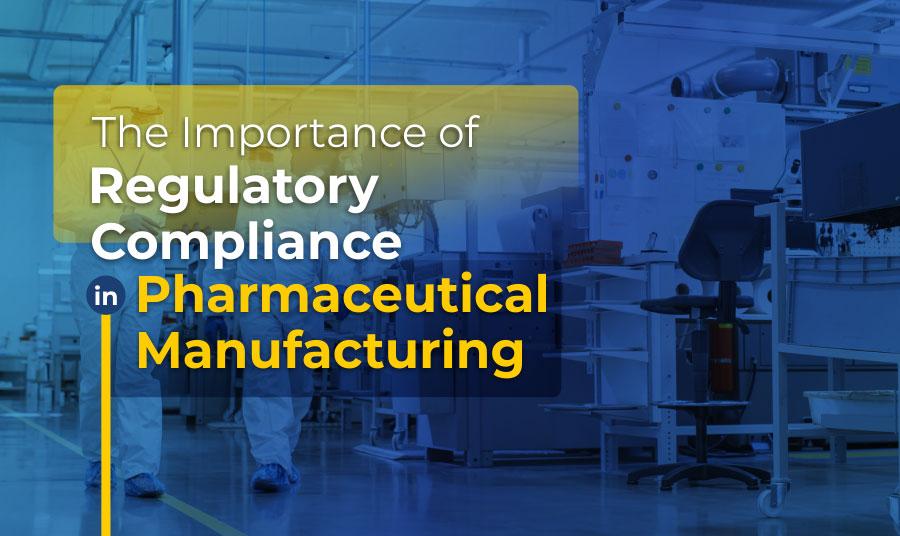Regulatory compliance in pharmaceutical manufacturing is critical to ensure that products are safe, effective, and of high quality. The pharmaceutical industry is one of the most heavily regulated sectors due to the direct impact its products have on human health. Therefore, adhering to regulatory standards is not just a legal requirement but also a moral obligation for manufacturers. This blog will delve into the significance of regulatory compliance in pharmaceutical manufacturing, discussing various aspects such as quality control, safety standards, and the implications of non-compliance.
Importance of Adhering to Regulatory Standards
Pharmaceutical manufacturing is subject to stringent regulations set by authorities such as the Food and Drug Administration (FDA) in the United States, the European Medicines Agency (EMA), and other global regulatory bodies. These regulations ensure that pharmaceutical products meet specific safety, efficacy, and quality standards. Regulatory compliance in pharmaceutical manufacturing involves following Good Manufacturing Practices (GMP) and ensuring that all processes are documented and validated.
Understanding Key Regulatory Requirements
Regulatory compliance in pharmaceutical manufacturing is governed by stringent guidelines set by various global regulatory bodies to ensure the safety, efficacy, and quality of pharmaceutical products. These regulations include Good Manufacturing Practices (GMP), Good Laboratory Practices (GLP), and Good Clinical Practices (GCP). Compliance with these standards is essential for pharmaceutical companies to operate legally and maintain consumer trust.
- Good Manufacturing Practices (GMP): GMPs are guidelines provided by regulatory agencies such as the FDA and EMA to ensure that products are consistently produced and controlled according to quality standards. They cover all aspects of production, from raw materials to finished products.
- Good Laboratory Practices (GLP): GLPs ensure the consistency, reliability, and reproducibility of laboratory studies, which are crucial for the development and approval of new drugs. These practices cover aspects such as study planning, execution, data collection, and reporting.
- Good Clinical Practices (GCP): GCPs are international ethical and scientific quality standards for designing, conducting, recording, and reporting clinical trials. Compliance with GCP ensures the rights, safety, and well-being of trial subjects.
Compliance with these standards is crucial for ensuring the safety, quality, and efficacy of pharmaceutical products. Other essential regulatory requirements include:
- Quality Control and Quality Assurance: Ensuring that products meet specified standards and are free from defects.
- Validation and Qualification: Verifying that processes, equipment, and systems consistently produce expected results.
- Documentation and Record Keeping: Maintaining detailed records of all processes and procedures to demonstrate compliance.
- Inspections and Audits: Regularly conducting internal and external audits to ensure ongoing compliance.
- Pharmacovigilance: Monitoring the effects of pharmaceutical products after they have been released to the market to identify and evaluate any adverse effects.
Failure to comply with these regulations can result in severe consequences, including product recalls, legal action, and significant financial losses. Moreover, non-compliance can tarnish a company’s reputation and erode consumer trust. Therefore, maintaining regulatory compliance is essential for the sustainability and success of pharmaceutical companies.
Role of Quality Control in Regulatory Compliance
Quality control is a fundamental aspect of regulatory compliance in pharmaceutical manufacturing. It involves rigorous testing and monitoring of raw materials, in-process materials, and finished products to ensure they meet predefined quality standards. Quality control processes are designed to detect any deviations or defects in the products, thereby preventing substandard or potentially harmful products from reaching the market.
Implementing robust quality control measures is essential for pharmaceutical manufacturers to maintain compliance with regulatory standards. This includes regular inspections, audits, and continuous improvement initiatives. Quality control not only ensures product safety and efficacy but also enhances operational efficiency and reduces the risk of costly recalls.
The Impact of Non-Compliance on Pharmaceutical Companies
Non-compliance with regulatory standards can have devastating effects on pharmaceutical companies. It can lead to product recalls, which are not only costly but also damage a company’s reputation. In severe cases, non-compliance can result in legal action, including hefty fines and criminal charges against company executives.
Additionally, non-compliance can disrupt the supply chain, leading to shortages of essential medications. This can have serious public health implications, particularly for patients who rely on these medications for chronic conditions. Therefore, ensuring regulatory compliance is crucial for pharmaceutical companies to avoid these negative consequences and maintain their market position.
Strategies for Achieving and Maintaining Regulatory Compliance
Staying compliant with regulatory standards in pharmaceutical manufacturing requires a proactive and strategic approach. Here are some key strategies:
- Implement Robust Quality Management Systems (QMS): Establishing a comprehensive QMS to manage and document all aspects of manufacturing processes.
- Regular Training and Education: Continuously training employees on the latest regulatory requirements and best practices to ensure they are well-informed and capable of maintaining compliance.
- Conducting Regular Audits and Inspections: Performing frequent internal audits and inspections to identify potential compliance issues and address them promptly.
- Staying Updated with Regulatory Changes: Keeping abreast of any changes in regulatory standards and ensuring that manufacturing processes are updated accordingly.
- Leveraging Technology and Automation: Utilizing advanced technology and automation to enhance accuracy, efficiency, and compliance in documentation and monitoring processes.
Why Staying Updated Matters?
Staying current with regulatory compliance is essential for several reasons:
- Ensuring Product Safety and Efficacy: Up-to-date compliance ensures that pharmaceutical products are safe and effective for consumers.
- Avoiding Legal and Financial Penalties: Non-compliance can lead to severe legal and financial repercussions, including fines, recalls, and lawsuits.
- Maintaining Market Access: Regulatory approval is often required to market products in different regions. Staying current ensures continuous access to these markets.
- Enhancing Consumer Trust: Compliance with regulatory standards builds consumer trust and confidence in the safety and quality of pharmaceutical products.
- Promoting Public Health: Adhering to regulatory standards ensures that only safe and effective products reach the market, thereby protecting public health.
Conclusion: The Imperative of Regulatory Compliance
In conclusion, regulatory compliance in pharmaceutical manufacturing is essential to ensure the safety, efficacy, and quality of pharmaceutical products. Adhering to regulatory standards not only helps prevent legal and financial repercussions but also safeguards public health and enhances consumer trust. By implementing effective quality control measures, staying informed about regulatory changes, and fostering a culture of compliance, pharmaceutical manufacturers can achieve and maintain regulatory compliance, ensuring their long-term success and sustainability in the industry.
Ensuring regulatory compliance is not just a regulatory obligation but a critical component of ethical pharmaceutical manufacturing.
Pharma Contract Manufacturing Companies
Pharma Contract Manufacturing Companies
Comments are closed.











